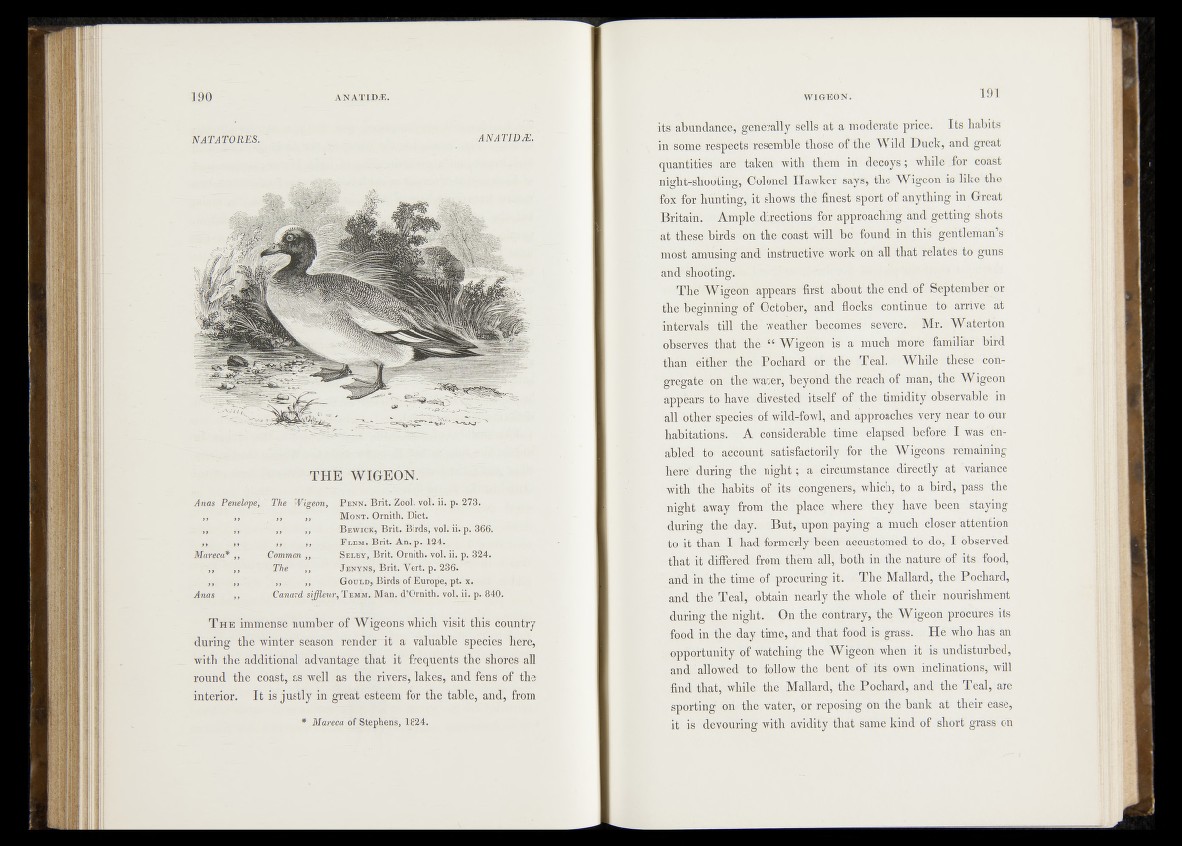
NATATORES. * ANATIDM.
T H E WIGEON.
Anas Penelope', ' The Wigeon, P enn. Brit. Zool. vq-I. ii. ,p. %?3. .
,, „ „ ,, Mont. Ornith. Diet.
= ,, „ ,, „ B ewick, Brit. BirSs, vol. ii. p. 366» ‘
,, . „ „ ,, Flem. Brit. An. p. i2 4 ..
Mareca* ,, -C om m o n ,,__ Selby ,,Brit. Oruith^volSih p: •,
( ,, The ,, J knyns, Brit. Vert. p. 236."
C ' -,}r- „ Gouljo, Birds of Europe, pt. x.
Anas ,, Canard siffleur, T emm. Man. tf’Ornith. voI.r>iL<Jp. 840.
T he immense number of Wigeons which visit this country
during the wintet season rendeirit a valuable' species “here,
with the additional advantage that it frequents the shores all
round the coast, as well as the rivers, lakes, and fens of the
interior. It is justly in great esteem for the table, and, from
Mareca p t Stephens, 1824.
its abundance, generalliy'-sells at a moderate price. Its habits
in some respects resemble those of the IVild’iDuck, and great
quantities are taken with them in decoys; while .for coast
night-shboTing,v€olonel Hawftet says*, the Wigeon is like the
fox fo^hfttting, it shows thedmest;,sport of anything in Great
Britain’. "Ample d ir e i^ S fiir approaching^and getting shots
'ah these birds'* on th e c ’Mstwill beh found.' in this - gentleman’s
m$Sp3 amusingnnd instructive work on all that relates to guns
and shootih^V
The app“ears!’1 first about'the end Of - Septeiaber^t
therbegirining of OfepIdV, and floh^^elh’tmfie^tb arrive at
ihtervals^till i^l^itetftHeT J^dcgn^^^Vere. ■ Mr. Waterton
observes’ th a t the ,i( MTigebn'i^ a m u |||| paore? femiliar bird
than .refffi^^bfedlsApochard p f t l e TeaftS While ^feB^e^fcoh-
1 *gre^ate*bn thetwatferf beyondffehlfer^achfof man, the. Wigeon
h av e iii^ ted ^ llsH f'b f- the *iam-idfty^eVservable in
all otherispldhfe'siof-wildrfowl, and approache^e%ilit'^^to our
^habitati'dMs. '- A^hej^ii!e^ible ' time^fllpSed^ before I was'en-
abledh tb’^ o u n t .satisfactorily for the. Wi|feo1a&^®emaining
■daered duririg^feb night; a • cireum stance ’directly at Variance .
% ith the it|bitsi ofii i#teengeirers, which, toV^Wrdj pass the
iri'gllt^away from Sfi|S)lace, wherer they haveybe^^^taying
during, theM%- But,,upon paying a much HoSerr'attention
to it than I 'had f© rm -M ^ ,^ ^ ^ ^ ^W S ed .fo do, I observed
-VhaHt differed from :jE|iu| a llf^ ^ ^ ^ .-th e nature of its food,
and in 'the timefof procuring* it. The! Mallard, the Pochard,
\ and the Teal, 'obtain nearly,Vffe.whble, of;,their nourishment
'Muring the, night# On the contrary, the Wigeqn procures its
food imthe day time, .and/that’fo'od iss. grass. - HV who has an
. opportunifys of ^ fe e lin g ’the'^Wigeon when it is undisturbed,
and'allowed tolfolfow da|it; of it%own inclinations,* will
-find .that, wjjfe !the Mallard, the .Pochard, and the Teal*JI«e
sporting qd the water,! or reposing on the bank at their ease,
it is devouring with aviditythat same’kindref short grass on